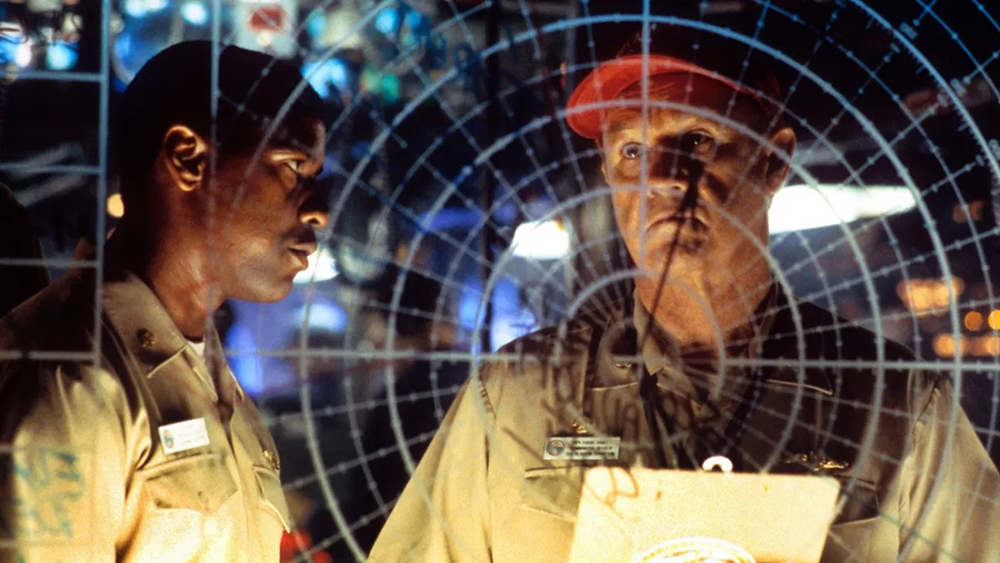In the ‘90s, Hollywood blockbusters scrambled to come up with fictive boogeymen to replace the Soviet menace. Studios concocted everything from extraterrestrial invaders (Independence Day, 1996) to terrorist hijackers (Air Force One, 1997), all in search for the theatergoing masses’ new existential enemy. But Tony Scott’s star-studded submarine thriller Crimson Tide (1995) suggested that the greatest threats to liberal hegemony could be found in the destabilizing regime change and separatist conflicts that immediately followed the dissolution of the U.S.S.R. In the film, the newly-established Russian Federation is beset by political instability and a bloody military quagmire in the caucuses. When an ultranationalist insurgent leader captures a nuclear missile base in Russia’s far east, veteran submariner Captain Frank Ramsey (Gene Hackman) and his X.O. Lt. Commander Ron Hunter (Denzel Washington) are deployed aboard the U.S.S. Alabama to the sub-nautical frontlines of potential nuclear cataclysm.
If Scott’s Top Gun (1986) displays a hypermasculine union between man and war machine, Crimson Tide depicts how these very same machines hold the world of men hostage. Overhead shots of F-14 Tomcats breaking the sonic barrier may imply a liberatory fantasy of warmaking technologies, but scenes inside the hull of an Ohio-class nuclear submarine are undoubtedly suffocating. The tightly packed, segmented layout of the submarine functions like a multi-tiered theater stage for the ensemble to play out a series of anxiety-riddled mutinies. The clashing screen presence of two Hollywood titans, Washington at the peak of his stardom and Hackman nearing the end of his, are totally uninterrupted by any grand special effects spectacles as the lives of billions are put at risk over disputed chain of command precedents in this tense, sweaty moral standoff between two stubborn U.S. naval officers. Here, the startling fragility of the post-Soviet, but still nuclear armed, geopolitical order comes to surface.
Scott is by no means a pioneer of the sub-flick or the mutiny movie. Early in the film, Viggo Mortensen’s Lt. Weps and James Gandolfini’s Lt. Bobby Dougherty are seen playing a trivia game, quizzing each other on the cast members of classic submarine films like The Enemy Below (1957) and Run Silent, Run Deep (1958). But more than its subaquatic predecessors, Crimson Tide evokes Battleship Potemkin (1925), another film in which immoral and rigid hierarchies are challenged out in the open sea. Crucially however, the sailors aboard the Potemkin did not have the ability to wipe out millions at the turn of a key. In Scott’s view, the romanticism of revolution and mutiny is all but lost in the age of mutually-assured destruction. Even as Ramsey and Hunter appear to settle their differences at the film’s end, saluting one another in their navy whites, there is a lingering sense of unease as the credits roll. In an age of non-stop warfare, rogue separatist uprisings and apocalyptic technological developments, superpowers like the United States are at the mercy of their own hyper-militarized global order.
Crimson Tide screens tonight, July 29, at Film at Lincoln Center on 35mm as part of the series “Gene Hackman: A Week with the Gene Genie.”



